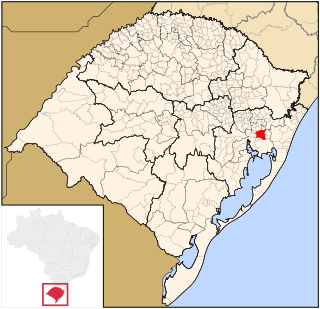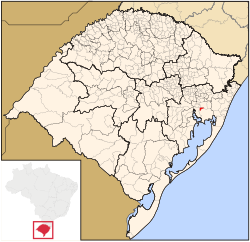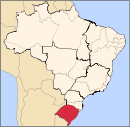
Uruguaiana is a municipality in the Brazilian state of Rio Grande do Sul. It is located on the eastern shore of the Uruguay River bordering Argentina. Opposite to Uruguaiana, and joined to it by a road/railway bridge, lies the Argentine city of Paso de los Libres, Corrientes. North of Uruguaiana lies the Brazilian municipality of Itaqui, connected by a bridge constructed by the British in 1888 over the Ibicuí River. The municipality also borders the municipalities of Alegrete, Barra do Quaraí and Quaraí, and, also, Uruguay, making it one of the few international triple-border municipalities of Brazil.

The Federal University of Rio Grande do Sul is a Brazilian public federal research university based in Porto Alegre, Rio Grande do Sul. UFRGS is among the largest and highest-rated universities in Brazil, having one of the largest number of scientific publications. From 2012 to 2019, the university was elected as the best federal university of Brazil. UFRGS has over 31,000 undergraduate students, over 12,000 graduate students, and more than 2,600 faculty members. As a Brazilian public federal institution, students do not pay tuition fees to enroll in courses offered by the university.

Montenegro is a municipality of the state of Rio Grande do Sul, Brazil. As of 2020, it has 65,721 inhabitants.

Cachoeirinha is a city in the Brazilian state of Rio Grande do Sul. Cachoeirinha is an alternative for the people who want to be near Porto Alegre. The city is situated at a strategic point in Rio Grande do Sul state. The city shares borders with Porto Alegre, Canoas, Esteio, Sapucaia do Sul, Gravataí and Alvorada. The city holiday is on May 15, the date on which the city declared its emancipation.

Gravataí is a Brazilian municipality near Porto Alegre at the Rio Grande do Sul State. Its population is approximately 280,000 people, making it the sixth most populous city in the state.

Canoas is a municipality in the state of Rio Grande do Sul, Brazil, forming part of the Greater Porto Alegre area. It is the largest municipality of the metropolitan region of Porto Alegre and the third largest municipality of Rio Grande do Sul. Officially declared a city on June 27, 1939, after its separation from São Sebastião do Caí and Gravataí, Canoas derives its name from the historical crafting of canoes in the area. It is the second largest city in the Porto Alegre metropolitan area, with the third-largest population and the third-highest GDP in the state. It is also ranked as the 79th most populous city in Brazil.

Coromandel is a Brazilian municipality, located in the southeast region of the country, in the state of Minas Gerais. Its population is estimated at 27,966 people as of 2020. The municipality (município) of Coromandel is located 495 km from the state capital Belo Horizonte, and 673 km from São Paulo. Coromandel is one of the municipalities of the Triângulo Mineiro/Alto Paranaíba micro region and its territorial size is 3,296 km2. Its borders are limited in the north by state of Goiás and Guarda-Mor municipality, east by the municipalities of Vazante, Lagamar, Patos de Minas and Guimarânia, west by the municipalities of Abadia dos Dourados and Monte Carmelo, and south by Patrocínio municipality. Coromandel has six districts: Alegre, Santa Rosa, Pântano de Santa Cruz, Lagamar dos Coqueiros and Mateiro.

Independência is a tiny neighborhood of the city of Porto Alegre, the state capital of Rio Grande do Sul in Brazil.

Maria Thereza Fontella Goulart is the widow of the 24th president of Brazil, João Goulart, and served as First Lady during his presidency from 1961 until 1964, when he was deposed by a military-led coup d'état.

Arambaré is a municipality in the state of Rio Grande do Sul, Brazil. It is bordered by Tapes on the north, Camaquã on the west and south, and Lagoa dos Patos on the east. It is at km 396 of the BR-116, 33 km from Camaquã. It is 156 km from Porto Alegre.

Cidade Baixa is a neighborhood of the city of Porto Alegre, the state capital of Rio Grande do Sul in Brazil. The neighborhood was created by the law number 2022 of December 7, 1959.
Passo do Sabão is a Brazilian district within the municipality of Viamão, in Rio Grande do Sul. It belongs to the group of three districts predominantly urban, with Viamão and Viamópolis. Passo do Sabão is also a district with a large population, with about 41% of the inhabitants of the municipality.
Chácara das Pedras is a neighbourhood (bairro) in the city of Porto Alegre, the state capital of Rio Grande do Sul, in Brazil. It was created by Law 2022 from December 7, 1959.
Jardim do Salso is a neighbourhood (bairro) in the city of Porto Alegre, the state capital of Rio Grande do Sul, in Brazil. It was created by Law 6594 from January 31, 1990. Basically Jardim do Salso is a residential neighbourhood.
Farrapos is a neighbourhood (bairro) in the city of Porto Alegre, the state capital of Rio Grande do Sul, in Brazil. It was created by Law 6218 from November 17, 1988.
Rubem Berta is a neighbourhood (bairro) in the city of Porto Alegre, the state capital of Rio Grande do Sul, in Brazil. It was created by Law 3159 from July 9, 1968.
Jardim Floresta is a neighbourhood (bairro) in the city of Porto Alegre, the state capital of Rio Grande do Sul, in Brazil. It was created by Law 2022 from December 7, 1959.

Greater Porto Alegre or the metropolitan area of Porto Alegre is the 5th most populous metro area in Brazil, with an estimated population of 4.3 million inhabitants encompassing 34 municipalities around Porto Alegre, the capital of the state of Rio Grande do Sul.

The Legislative Assembly of Rio Grande do Sul is the regional parliament of Rio Grande do Sul, a federative unit in Brazil. It has 55 state deputies elected every 4 years.
José Portella Delavy was a Brazilian singer and composer known for composing the song "Para Pedro" with José Mendes. The song is an exemplar of Brazilian gaucho music.

















